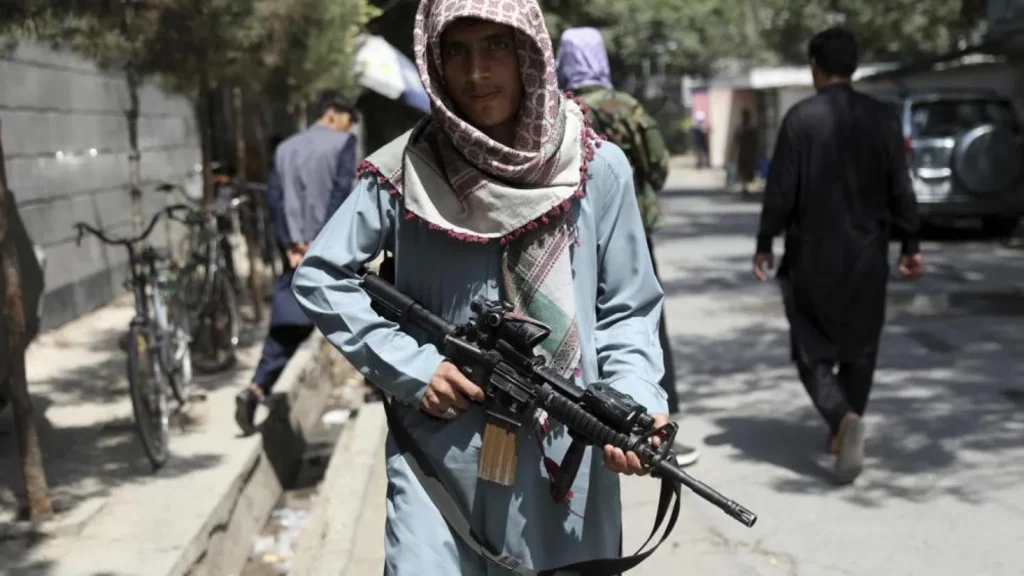Al-Qaeda Reopens Terror Camps, Taliban Resumes Public Executions, Floggings

The radical Islamic Taliban group has resumed the gruesome practices of public executions and floggings in Afghanistan.
Thousands of onlookers observed the latest public execution which was held in a sports stadium Monday for a man convicted of murder. It’s the third such execution to be carried out this month and the fifth since the U.S. abandoned Afghanistan to the Taliban in August 2021.
The executed man, Nazar Mohammad from the district of Bilcheragh in Faryab province, had allegedly killed a man named Khal Mohammad.
The execution took place during heavy snowfall in the city of Shibirghan and security around the stadium was tight, an anonymous eyewitness told The Mirror.
According to the report, Khal Mohammad’s brother carried out the execution, shooting Nazar Mohammad five times in the chest.
The Taliban’s supreme court said in a statement that Monday’s death sentence was carried out following approval from three of the country’s highest courts and the Taliban supreme leader, Hibatullah Akhundzada.
Last Thursday, the Taliban executed two men convicted of stabbing several victims to death.
Relatives of the victims were allowed to shoot the convicts as thousands watched.
“One was shot eight times while the other received six bullets,” an eyewitness who requested anonymity told RFE/RL’s Radio Azadi.
Abubakar Siddique, senior correspondent at RFE/RL’s Radio Azadi says the execution are proof that the Taliban has resumed implementation of harsh “Islamic Shari’a law.”
“The Taliban’s use of corporal and capital punishments and retributive justice underscores its commitment to imposing strict Islamic Shari’a law,” he wrote.
“These punishments have provoked strong criticism from human rights watchdogs and Afghans. Meanwhile, Islamic scholars have questioned whether the Taliban has met the stringent conditions required by Islamic law in implementing such harsh punishments,” Siddique added.
The Taliban’s supreme court also confirmed in separate statements that a man and a woman convicted of adultery were flogged with 35 lashes each in northern Balkh province over the weekend. And two other people were given 30 lashes for committing immoral acts.
The United Nations has strongly criticized the Taliban for carrying out public executions, lashings, and stonings since seizing power after U.S. and NATO troops staged a chaotic exit from the country after nearly two decades of war.
“The public nature of execution is extremely heinous, and we continue to stand against the use of the death penalty,” U.N. spokesman Stephane Dujarric said.
MUST SEE Al Qaeda, ISIS Rebuild in Afghanistan; Christians Face Deadly Danger and Soon the West Could Too
Initially, the Taliban had promised a moderate rule but soon began carrying out severe punishments in public including executions, floggings, and stonings.
The punishments are similar to those during their previous rule of Afghanistan in the late 1990s when Osama bin Laden and his Al Qaeda terrorists were also given a safe haven in the country to plot their 9/11 attack against the U.S.
The U.N. has called on the country’s rulers to halt its extreme practices.
Despite the international criticism, Siddique says the group will not stop.
“With the Taliban bent on creating a ‘pure’ Islamic system in Afghanistan, the group is likely to increase its use of harsh Islamic punishments,” he wrote.
Al Qaeda Resumes Terrorist Training
Meanwhile, Al Qaeda is also enjoying a resurgence under the Taliban’s rule.
The terrorist organization has set up eight new training camps alongside five Islamic educational institutions, a report from the U.N. Security Council in late January revealed.
“The group maintains safe houses to facilitate the movement between Afghanistan and the Islamic Republic of Iran in the provinces of Herat, Farah, and Helmand, with additional safe house locations in Kabul,” the report said.
Silvia Boltuc, managing director at the SpecialEurasia business and geopolitical intelligence platform, told The Media Line the political instability in Afghanistan has bolstered the resurgence of the terrorist group.
“There has been a notable escalation in terrorist attacks, from roadside and suicide bombs to rocket and mortar fire, direct fire, kidnappings, and violent crimes,” Boltuc said.

voip for pc https://otvetnow.ru magento setup